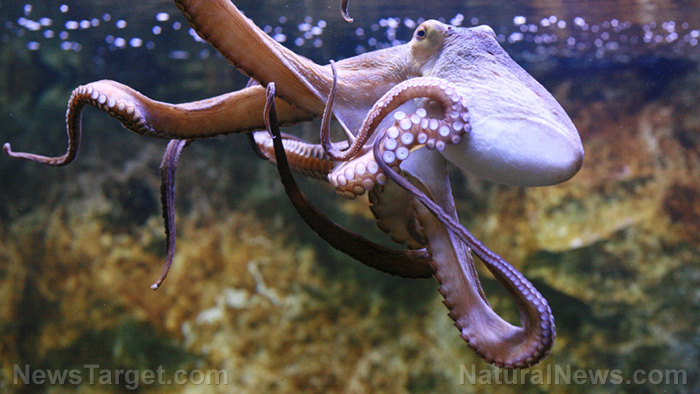UK government plans to recognize several marine animals as sentient beings
12/01/2021 / By Arsenio Toledo

The government of the United Kingdom is planning to recognize several marine animals – including squids, octopuses, lobsters and crabs – as sentient beings.
The decision comes after the release of a new report by researchers from the London School of Economics and Political Science (LSE). This report reviewed hundreds of scientific studies that contain evidence regarding the potential sentient capabilities of cephalopod mollusks like octopuses, squids and cuttlefish and decapod crustaceans like shrimp, lobsters, crabs and crayfish.
“After reviewing over 300 scientific studies, we concluded that cephalopod mollusks and decapod crustaceans should be regarded as sentient, and should therefore be included within the scope of animal welfare law,” lead researcher Jonathan Birch, an associate professor at LSE and a specialist in the philosophy of the biological sciences, said in a statement.
“Sentience is the capacity to have feelings, such as feelings of pain, pleasure, hunger, thirst, warmth, joy, comfort and excitement,” wrote Birch and the other researchers in the report.
The researchers assessed these eight measures of sentience by reviewing experiments that studied among other things the learning ability, the presence of pain receptors and their connection to the brains of the animals, the response to anesthetics and the behaviors that demonstrate protectiveness of an injury.
The report found that the animals have an incredible capacity to exhibit many of the measures of sentience listed above, thanks in part to their complex central nervous systems. (Related: From the sea to the stars: Scientists study octopuses to understand intelligent life on other planets.)
For example, the report found that cuttlefish can pass cognitive tests designed for human children. Crabs can experience pain and develop protective behaviors to avoid it in the future, learn to navigate complex mazes and suffer stress from excessive noise.
Octopuses can recognize individual humans, remember how to solve puzzles they have encountered before and are great at problem-solving. They can also feel emotional distress. When they are trapped in environments that lack stimulation, they can become frustrated and bored.
“Crustaceans and cephalopods undoubtedly experience the world in extremely different ways to ourselves. What matters, though, is whether that experience entails conscious experience of pleasure and pain,” concluded the report. “We believe that the evidence is sufficient to show that these animals do experience pleasure and pain.”
The report admits that some of the characteristics that suggest sentience are lacking in some of the species, but this is due more to the lack of research rather than evidence of absence. This is why the report recommends extending protections to all cephalopod mollusks and decapod crustaceans.
British parliament to amend Animal Welfare Sentience Bill
Following the release of the LSE’s report, members of the British parliament have moved forward with amendments to the Animal Welfare Sentience Bill.
Currently, the Animal Welfare Sentience Bill recognizes all vertebrates, or animals with backbones, as sentient beings. The amendment will listen to the recommendations of the LSE’s report and recognize decapod crustaceans and cephalopod mollusks as sentient beings.
“The U.K. has always led the way on animal welfare and our Action Plan for Animal Welfare goes even further by setting out our plans to bring in some of the strongest protections in the world for pets, livestock and wild animals,” said Animal Welfare Minister Lord Zac Goldsmith in a statement.
“The Animal Welfare Sentience Bill provides a crucial assurance that animal wellbeing is rightly considered when developing new laws,” he continued. “The science is now clear that decapods and cephalopods can feel pain and therefore it is only right they are covered by this vital piece of legislation.”
Opposition legislators have criticized the bill for not affecting existing legislation regarding decapods and cephalopods and not having the power to make any changes to current industry practices that affect them, such as in the fishing and restaurant industries.
“The government can simply ignore it and do their own thing,” remarked Baroness Jenny Jones, a member of Britain’s upper house – the House of Lords.
Other critics have pointed out that focusing on individual animal welfare can distract from systemic problems that these animals face, such as the wide-scale destruction of their habitats.
The only guarantee the bill enacts is the creation of an Animal Sentience Committee made up of experts from within the field. This committee will issue reports whenever the government has to make decisions that affect the welfare of the sentient animals listed in the bill. The government will not be compelled to follow the committee’s recommendations.
Many of those concerned about the wellbeing of these sentient animals want the bill to go further and outlaw certain questionable practices that involve the animals. The LSE’s report even recommends that the government take “proportionate steps to regulate practices that are a source of reasonable and widespread animal welfare concerns.”
Some of these practices include the declawing of decapods, transporting them live in freezing temperatures and boiling them alive.
Learn more about the intelligence of animals and the moves being made to extend welfare protection to certain species by reading the latest articles at WeirdScienceNews.com.
Sources include:
LSE.AC.uk [PDF]
Tagged Under: animal rights, animal sentience, animal welfare, cephalopods, crabs, crustaceans, decapods, Ecology, environment, lobsters, marine life, mollusks, octopus, research, squids, United Kingdom, weird science
RECENT NEWS & ARTICLES
COPYRIGHT © 2017 DISCOVERIES NEWS





















